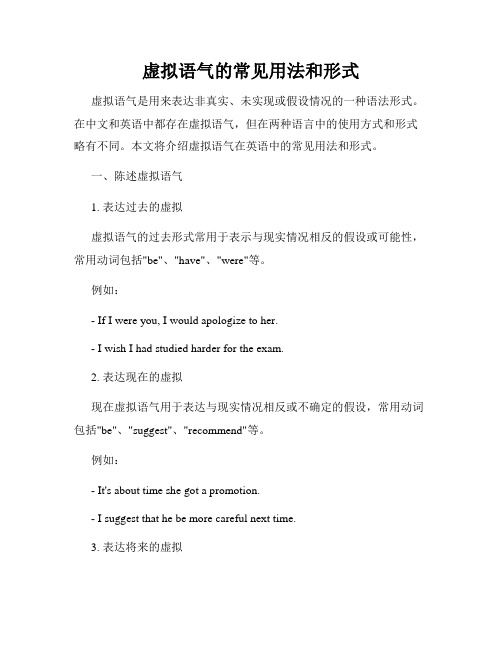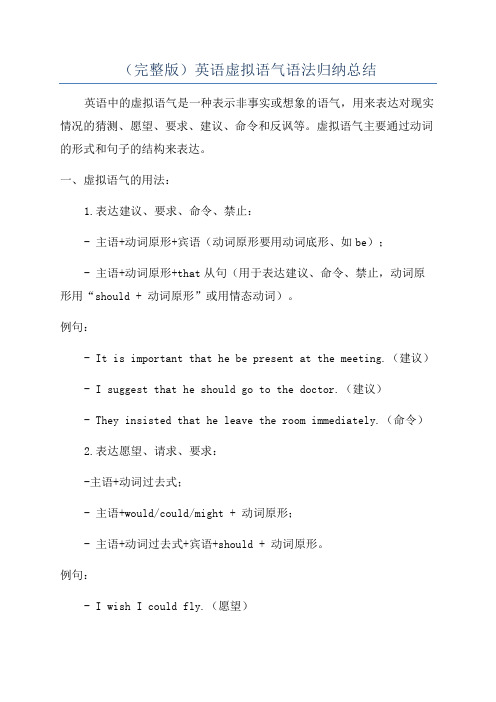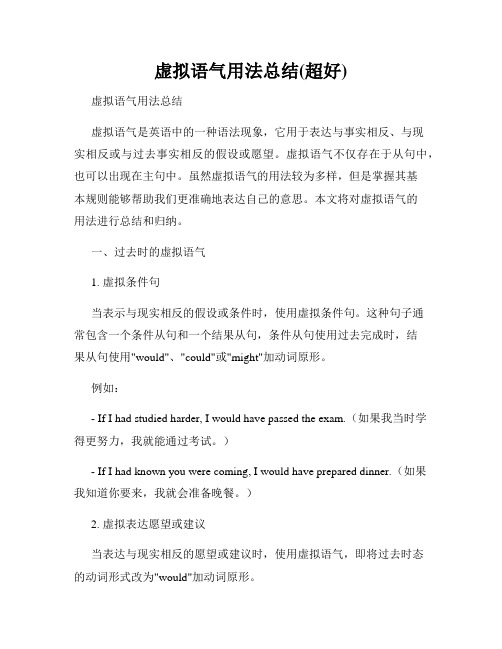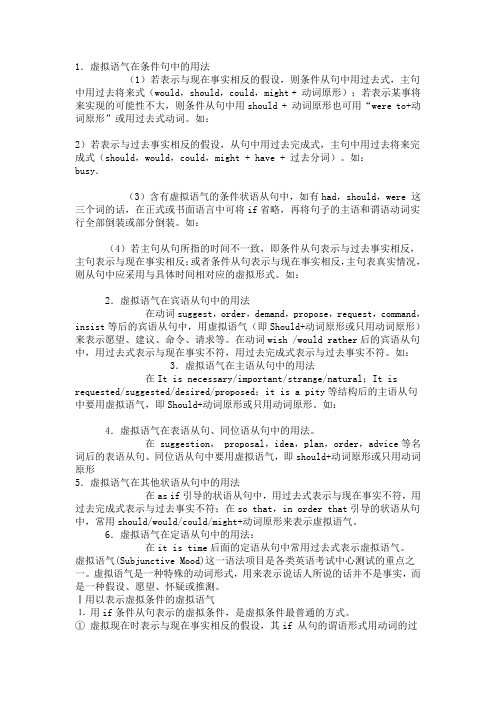虚拟语气完整用法
虚拟语气的常见用法和形式

虚拟语气的常见用法和形式虚拟语气是用来表达非真实、未实现或假设情况的一种语法形式。
在中文和英语中都存在虚拟语气,但在两种语言中的使用方式和形式略有不同。
本文将介绍虚拟语气在英语中的常见用法和形式。
一、陈述虚拟语气1. 表达过去的虚拟虚拟语气的过去形式常用于表示与现实情况相反的假设或可能性,常用动词包括"be"、"have"、"were"等。
例如:- If I were you, I would apologize to her.- I wish I had studied harder for the exam.2. 表达现在的虚拟现在虚拟语气用于表达与现实情况相反或不确定的假设,常用动词包括"be"、"suggest"、"recommend"等。
例如:- It's about time she got a promotion.- I suggest that he be more careful next time.3. 表达将来的虚拟将来虚拟语气用于表达与现实情况相反或不可能实现的假设,常用动词包括"should"、"were to"等。
例如:- If I should win the lottery, I would buy a big house.- If it were to rain, the event would be canceled.二、命令虚拟语气当表示一种命令、建议或要求时,常使用虚拟语气来显得客气或委婉。
例如:- I suggest that you arrive on time for the meeting.- It's important that he be there for the ceremony.三、愿望虚拟语气愿望虚拟语气用于表达对过去、现在或将来的愿望、期望或希望。
(完整版)英语虚拟语气语法归纳总结

(完整版)英语虚拟语气语法归纳总结英语中的虚拟语气是一种表示非事实或想象的语气,用来表达对现实情况的猜测、愿望、要求、建议、命令和反讽等。
虚拟语气主要通过动词的形式和句子的结构来表达。
一、虚拟语气的用法:1.表达建议、要求、命令、禁止:- 主语+动词原形+宾语(动词原形要用动词底形、如be);- 主语+动词原形+that从句(用于表达建议、命令、禁止,动词原形用“should + 动词原形”或用情态动词)。
例句:- It is important that he be present at the meeting.(建议)- I suggest that he should go to the doctor.(建议)- They insisted that he leave the room immediately.(命令)2.表达愿望、请求、要求:-主语+动词过去式;- 主语+would/could/might + 动词原形;- 主语+动词过去式+宾语+should + 动词原形。
例句:- I wish I could fly.(愿望)- I would appreciate it if you could help me.(请求)3.表示虚拟条件:- If条件从句中的谓语动词用过去完成时,主句用would/should/might/could + have + 过去分词;- If条件从句中的谓语动词用过去时,主句用would/should/could + 动词原形。
例句:- If I had known his phone number, I would have called him.(虚拟条件)- If you had listened to me, we could have finished the project earlier.(虚拟条件)4.表达建议、要求、祝愿:- If only内部称述 + 主语 + 过去式。
虚拟语气的用法归纳

虚拟语气是一种特殊的动词形式,用来表达说话人的假设、愿望、猜测、建议等非现实的情况。
虚拟语气在英语中的使用非常广泛,包括情态动词、动词的过去式、过去完成时、be 型虚拟式等形式。
下面我将详细介绍虚拟语气的用法。
一、情态动词的虚拟语气1. 表示现在或将来的假设例如:If I had money, I would travel around the world.2. 表示过去的假设例如:If I had studied harder, I would have passed the exam.3. 表示与现在事实相反的愿望例如:I wish I were rich.4. 表示与过去事实相反的愿望例如:I wish I had studied harder.5. 表示与将来事实可能相反的愿望例如:I wish it would stop raining.二、动词的过去式的虚拟语气1. 表示现在或将来的假设例如:If I knew the answer, I would tell you.2. 表示过去的假设例如:If I had seen the movie, I would have recommended it to you.三、过去完成时的虚拟语气1. 表示过去的假设例如:If I had had more time, I would have finished the work.2. 表示与过去事实相反的愿望例如:I wish I had gone to the party last night.四、be型虚拟式1. 表示现在或将来的假设例如:If I were you, I would take the job.2. 表示与现在事实相反的愿望例如:I wish I were in Hawaii now.五、混合虚拟语气1. 表示过去的假设例如:If I had known that you were coming, I would have met you at the airport.2. 表示与过去事实相反的愿望例如:I wish I had studied harder and passed the exam.六、虚拟语气的特殊用法1. 在某些形容词后面使用虚拟语气例如:It is important that you be on time.2. 在某些名词后面使用虚拟语气例如:It is necessary that he study harder.3. 在某些介词后面使用虚拟语气例如:I am glad that you came.以上是虚拟语气的用法归纳,希望对大家有所帮助。
虚拟语气的用法总结

虚拟语气的用法总结以下是小编为大家总结的虚拟语气的用法,希望能帮助大家更好地掌握英语中虚拟语气的用法,提高英语水平。
一、虚拟语气的使用范围:虚拟语气用来表示说话人所说的话并不是事实,而是一种假设、愿望、怀疑或推测。
该语法主要用于if 条件状语从句中,也可用于主语从句、表语从句和宾语从句等。
二、虚拟语气的判断:1. if 条件状语从句中虚拟语气的判断。
if 条件状语从句有真实条件句和非真实条件句。
假设条件可以实现的句子为真实条件句,反之为非真实条件句,要用虚拟语气。
其形式分为以下三种:(1) 与过去事实相反的假设。
结构为:从句的谓语动词用“had + 过去分词”,主句用“should (would, could, might) + have + 过去分词”。
例如:If it had not rained so hard yesterday, we could have played tennis. 如果昨天没有下大雨,我们就能玩网球了。
(2) 与现在事实相反的假设。
结构为:从句的谓语动词用过去式,系动词用were,主句的谓语用“should (would, could, might) + 动词原形”。
例如:If I were in your position, I would marry her. 如果我是你,我就娶她为妻。
(3) 与将来事实相反的假设。
结构为:从句的谓语动词用“should (were to) + 动词原形”,主句用“should(would, could, might) + 动词原形”。
例如:If you should miss the chance, you would feel sorry for it. 如果你错过了这次机会,你会难过的。
2. 宾语从句中的虚拟语气用法。
(1) wish后接宾语从句中的虚拟语气:根据从句的意义来判断。
A: 表示与现在和将来事实相反的愿望,从句谓语动词用过去时态。
虚拟语气用法总结(超好)

虚拟语气用法总结(超好)虚拟语气用法总结虚拟语气是英语中的一种语法现象,它用于表达与事实相反、与现实相反或与过去事实相反的假设或愿望。
虚拟语气不仅存在于从句中,也可以出现在主句中。
虽然虚拟语气的用法较为多样,但是掌握其基本规则能够帮助我们更准确地表达自己的意思。
本文将对虚拟语气的用法进行总结和归纳。
一、过去时的虚拟语气1. 虚拟条件句当表示与现实相反的假设或条件时,使用虚拟条件句。
这种句子通常包含一个条件从句和一个结果从句,条件从句使用过去完成时,结果从句使用"would"、"could"或"might"加动词原形。
例如:- If I had studied harder, I would have passed the exam.(如果我当时学得更努力,我就能通过考试。
)- If I had known you were coming, I would have prepared dinner.(如果我知道你要来,我就会准备晚餐。
)2. 虚拟表达愿望或建议当表达与现实相反的愿望或建议时,使用虚拟语气,即将过去时态的动词形式改为"would"加动词原形。
例如:- I wish I were taller.(我希望我更高。
)- She suggested that he take a bus.(她建议他坐公交车。
)二、现在时的虚拟语气1. 虚拟条件句与过去时的虚拟条件句类似,现在时的虚拟条件句也包含一个条件从句和一个结果从句。
条件从句使用"were to"结构或"should"加动词原形,结果从句使用"would"、"could"或"might"加动词原形。
例如:- If I were to win the lottery, I would travel the world.(如果我中了彩票,我会周游世界。
虚拟语气用法大全

1.虚拟语气在条件句中的用法(1)若表示与现在事实相反的假设,则条件从句中用过去式,主句中用过去将来式(would,should,could,might + 动词原形);若表示某事将来实现的可能性不大,则条件从句中用should + 动词原形也可用“were to+动词原形”或用过去式动词。
如:2)若表示与过去事实相反的假设,从句中用过去完成式,主句中用过去将来完成式(should,would,could,might + have + 过去分词)。
如:busy.(3)含有虚拟语气的条件状语从句中,如有had,should,were 这三个词的话,在正式或书面语言中可将if省略,再将句子的主语和谓语动词实行全部倒装或部分倒装。
如:(4)若主句从句所指的时间不一致,即条件从句表示与过去事实相反,主句表示与现在事实相反;或者条件从句表示与现在事实相反,主句表真实情况,则从句中应采用与具体时间相对应的虚拟形式。
如:2.虚拟语气在宾语从句中的用法在动词suggest,order,demand,propose,request,command,insist等后的宾语从句中,用虚拟语气(即Should+动词原形或只用动词原形)来表示愿望、建议、命令、请求等。
在动词wish /would rather后的宾语从句中,用过去式表示与现在事实不符,用过去完成式表示与过去事实不符。
如:3.虚拟语气在主语从句中的用法在It is necessary/important/strange/natural;It is requested/suggested/desired/proposed;it is a pity等结构后的主语从句中要用虚拟语气,即Should+动词原形或只用动词原形。
如:4.虚拟语气在表语从句、同位语从句中的用法。
在 suggestion, proposal,idea,plan,order,advice等名词后的表语从句、同位语从句中要用虚拟语气,即should+动词原形或只用动词原形5.虚拟语气在其他状语从句中的用法在as if引导的状语从句中,用过去式表示与现在事实不符,用过去完成式表示与过去事实不符;在so that,in order that引导的状语从句中,常用should/would/could/might+动词原形来表示虚拟语气。
虚拟语气的用法总结
虚拟语气是一种在语法上表示非事实或假设情况的语气。
它常用于表达愿望、建议、要求、命令、假设条件和虚拟情况等。
以下是虚拟语气的用法总结:1. 表达愿望:- 与过去事实相反的愿望:希望+过去式例如:I wish I were there.(我希望我在那里。
)- 对未来的愿望:希望+动词原形例如:I hope it stops raining.(我希望它停止下雨。
)2. 表达建议、要求和命令:- 表达建议:(should) + 动词原形例如:They suggested (that) he should take a break.(他们建议他休息一下。
)- 表达要求:(would) + 动词原形例如:He asked that she would close the door.(他要求她关上门。
)- 表达命令:(should) + 动词原形例如:It is important that you should arrive on time.(你准时到达很重要。
)3. 表达假设条件:- 表示与现在或将来事实相反的假设条件:if + 过去式,would + 动词原形例如:If I were rich, I would travel around the world.(如果我富有,我会周游世界。
)- 表示与过去事实相反的假设条件:if + had + 过去分词,would + have + 过去分词例如:If he had studied harder, he would have passed the exam.(如果他学习更努力,他就能通过考试。
)4. 表达推测和假设:- 推测现在的事实:(should) + 动词原形例如:He is late. He should be stuck in traffic.(他迟到了。
他可能被堵在交通上了。
)- 对过去的推测:(should) + have + 过去分词例如:She has disappeared. She should have left early.(她已经消失了。
虚拟语气的用法总结
虚拟语气的用法总结虚拟语气是一种语法现象,常常用于表达非真实情况、假设情况、愿望意愿等。
在英语中,虚拟语气有两种形式:过去虚拟语气和现在虚拟语气。
下面是对虚拟语气的用法进行总结。
一、过去虚拟语气的用法:1. 表达不可能实现的愿望、欲望或建议:If only + 主语 + 过去完成时(had + 过去分词)例句:If only I had studied harder, I would have passed the exam.(要是我当初努力学习的话,我就能通过考试了。
)2. 表示对过去发生的事情的假设:If + 主语 + had + 过去分词, 主语 + would/could/might + 动词原形例句:If I had taken the bus, I would have arrived on time.(要是我坐公共汽车的话,我本能准时到达。
)3. 表示对与现在事实相反的情况的假设:If + 主语 + 过去式, 主语 + would/could/might + 动词原形例句:If I were you, I would apologize to her.(要是我是你的话,我会向她道歉。
)4. 表达对不可能实现的条件:If only + 过去式例句:If only I had a million dollars.(要是我有一百万美元该多好。
)二、现在虚拟语气的用法:1. 表达建议、命令等正式用法:表达建议:(should +动词原形/动词原形)例句:It's important (that) you should take some rest.(你应该休息一下,这很重要。
)表达命令:(应用“命令式”的虚拟形式)例句:It's vital (that) he be here on time.(他必须准时到达,这很重要。
)2. 表达愿望、要求、建议等陈述式的用法:It's time/It's high time + 过去式例句:It's time you went to bed.(你该去睡觉了,时间到了。
虚拟语气的使用
虚拟语气的使用虚拟语气是指用来表达与事实相反、与现实不符或未发生的情况的一种语气。
在中文中,虚拟语气主要通过词语的选择、句子结构的变化以及语气的表示来体现。
在英语中,虚拟语气则有特定的形式和用法。
虚拟语气在表达假设、愿望、建议、命令等语境中广泛使用。
本文将详细讨论虚拟语气的用法和相关例句。
一、虚拟语气的基本形式虚拟语气在英语中有多种形式,包括虚拟语气的一般现在时、过去时、过去将来时以及与现在事实相反、与过去事实相反的虚拟语气。
具体形式如下:1. 虚拟语气的一般现在时虚拟语气的一般现在时用于表示与现在事实相反的情况。
其构成为:主语 + "would/could/should/might" + 动词原形。
例句1:If I were rich, I would travel around the world.(如果我有钱,我将会环游世界。
)例句2:She suggested that her brother should study abroad.(她建议她的弟弟出国留学。
)2. 虚拟语气的过去时虚拟语气的过去时用于表示与过去事实相反的情况。
其构成为:主语 + "would/could/should/might" + have + 过去分词。
例句1:If I had known the truth, I would have made a different decision.(如果我当时知道真相,我会作出不同的决定。
)例句2:She wishes she could have attended the party last night.(她希望昨晚能参加派对。
)3. 虚拟语气的过去将来时虚拟语气的过去将来时用于表示与过去将来事实相反的情况。
其构成为:主语 + "would/could/should/might" + have + 过去分词。
虚拟语气用法总结(完整)
虚拟语气用法总结(完整)if+主语+had+过去分词+其他+主语+should/would/could/might+have+过去分词+其他例:1.XXX,XXX如果我知道你要来,我就会准备些食物的。
(事实:我不知道)2.XXX,XXX.如果我当时研究更努力些,我就能通过考试了。
(事实:我没有用功研究)3、表示与将来事实相反的情况:if+主语+were/should+动词原形+其他+主语+would/could/might+动词原形+其他例:1.IfIwereyou,XXX.如果我是你,我不会那样做。
(将来:我不可能成为你)2.XXX,XXX.如果下雨了,带上这把伞。
(将来:不一定会下雨)1.If I had arrived earlier。
I would have been able to meet her。
(Fact: I arrived late)2.If he had XXX my advice。
he would not have made such a mistake。
(Fact: He didn't listen to me)3.If he were to come here tomorrow。
I would talk to him。
(Fact: It's XXX he will come)In expressing ns。
orders。
requests。
etc。
the subjunctive mood is often used in the object clause。
with the verb in the form of "should + infinitive," which can be omitted.Other uses of XXX:1.The subjunctive mood is used in the object clause after "wish" to express a XXX fact。
- 1、下载文档前请自行甄别文档内容的完整性,平台不提供额外的编辑、内容补充、找答案等附加服务。
- 2、"仅部分预览"的文档,不可在线预览部分如存在完整性等问题,可反馈申请退款(可完整预览的文档不适用该条件!)。
- 3、如文档侵犯您的权益,请联系客服反馈,我们会尽快为您处理(人工客服工作时间:9:00-18:30)。
虚拟语气
一、用固定的情态动词表示的虚拟语气
1、 should +动词原形(有时省略should)
(1)用在动词如advise, request, require, suggest, urge,demand,
desire,command, insist, order, propose, recommend, 等后的宾语从句中。
例如:
1)They requested that we (should) send a invitation to their school、
2)He urged that he acquaint and apply the methods、
2、用在it is suggested,it has been decided, it is desired, it was proposed,it is required, it was ordered, it is necessary (essential, imperative, important, desirable) that等引出的主语从句中。
例如:
1)It is required that we (should) get everything done by tomorrow night、
2)It is imperative that the teachers (should) have a thorough knowledge of the subject they teach、
3、用在suggestion, motion, proposal, order, recommendation, plan, idea, requirement等引起的表语从句与同位语从句
例如:She drives her vessel carefully lest she should lost her way、
4.用在表示比拟的方式状语从句中
例如:He laughed as if he had never been happier before、
5.用在表示虚拟情况的定语从句中
例如:It is high time you stop bitting your child、
6.用在某些表示主观愿望的名词从句中
例1:I wish I were as tall as you、
例2:He insisted that we (should) catch up the first bus in the morning、
7.用在婉转的请求、建议、批评等句子中
例1:Could you hand me some pepper?
例2:You might have told me earlier、
例3:Hadn’t you better go and see you lover ?
8.用在表示祝愿的简单句中
例1:Long live world peace、
例2:May you best、
二.虚拟语气谓语动词的几种表现形式:
1.用于虚拟条件句中
虚拟条件句及其主句的谓语形式可归纳如下:
从句谓语主句谓语
与现在事实相反 were, did would (should, could, might) + v、
与将来事实相反 should do, would (should, could, might) + v、
(可能性极小) were+to+v、
与过去事实相反 had done would (should, could, might) + have done
例1:I could definitely see the final score if I had the time、
例2:How nice it would be if you could bring a gift、
例3:Thay might have arrived on time if the car haven’t broken down on the road、
如果条件从句中包含有were, had, should或could,有时可把if省略掉,但这时要把were, had, should或could放在主语前面(这种结构在口语中较少使用)。
例如:
1)Had we made (= If we had made ) adequate preparations, we might have made it、
2)Were there no gravity, we would be floating in the air、
3)Should it rain tomorrow, the sports meeting would be put off、
2.用在含蓄条件句中
句子中,假设的情况不用条件从句表示出来,而就是用一个介词短语来表示,句子的谓语形式也可遵循表7的规则。
这种用法也常见于or, or else, otherwise 与but后面的分句中。
例如:
1)Without magazine, the world would be a dull place、
2)But for his help, they would have been dropped into the ocean、
3)She would have gone with us, but she didn’t have time、
4)He must have had an accident, or he would have been here then、
3.用在错综时间条件句中
有时候,条件从句表示的动作与主句表示的动作发生的时间并不一致,这时,谓语动词的形式要根据表示的时间来调整,这种句子可称作错综时间条件句。
例如:
1)If you hadn’t watched television so late, you wouldn’t be so sleepy now、(此句为时间交错的虚拟条件句,从句表示与过去事实相反的假设,主句则假设与现在情况相反)
2)If you were in shape, we would have allowed you to join them in the project、(从句表示与现在事实相反的假设,主句则表示一种与过去事实相反的设想)
4.用在wish后的宾语从句中
这种句子主要表示愿望,that常省略。
若指现在或将来的愿望,从句用过去时;若指过去没有实现的愿望,从句用过去完成时。
例如:
1)I wish I had learned to play tennis、(与过去事实相反)
2)I wish I remembered his phone number、(与现在事实相反)
3)I wish she would try again、(对将来情况的假设)
若wish 后的宾语从句中用would,可以表示请求,通常意味着说话人的不快或不满。
例如:
1)I wish you would help us、
2)I wish you would stop asking such silly questions、
5.用在if only感叹句中
当表示“但愿”,“要就是…就好”时,它的用法与wish基本相同,只就是更富有感情色彩,表示一时很难实现的愿望。
例如:
1)If only I knew what you wanted、
2)If only you hadn’t told him what I said, everything would have been all right、
6.用在以as if (as though) 引出的方式状语从句中
当表示过去想象中的动作或情况时,用过去完成时;当表示与现在事实相反或对现在情况有所怀疑时,用一般过去时。
例如:
1)The old couple loved the orphan girl as if she had been their daughter、
2)It seems as if it were spring、
7.用在某些虚拟的定语从句中
例1:He was the very person I should have been wished to see、
例2:It’s (high) time that we went to class、
9.用以表示说话人的主观愿望或选择,仅用在一些惯用句型的从句中
例1:I’d rather they came tomorrow、
例2:He’d rather I went to Fuzhou by sea、
例3:I’d just as soon you didn’t watch television this evening、
但had rather, would rather, would just as soon, would sooner等惯用语如用在简单句中,其后都用不加to的动词不定式。
例如:
1)I’d rather die than give up my principle、
2)I’d just as soon (would sooner) resign than take part in such dishonest deals、。
